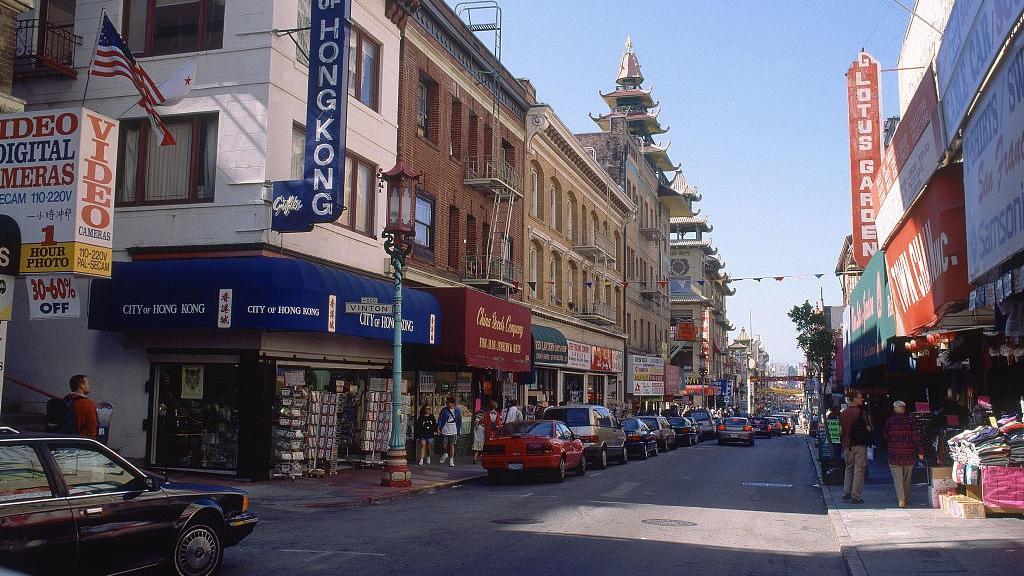Chinese Americans call for equal rights amid increasing anti-Asian sentiments
 Pedestrians are seen walking along a street in San Francisco's Chinatown in California, United States. (PHOTO / VCG)
Pedestrians are seen walking along a street in San Francisco's Chinatown in California, United States. (PHOTO / VCG)
Eighty years after a discriminatory law targeting Chinese people was repealed, Chinese Americans say they still face racial discrimination.
"Despite the perception that we are living in peaceful times today, frightening things are still happening," Haipei Shue, president of the United Chinese Americans, said. "It's essential for the entire Chinese American community to unite and navigate these challenging times."
The United Chinese Americans, a Chinese American rights organization in Washington, was one of the hosts at a conference on Tuesday commemorating the 80th anniversary of the repeal of the Chinese Exclusion Act.
Nearly 400 representatives from 121 Chinese American organizations in 26 US states gathered for the conference, themed "Promoting Civil Rights for All Americans, Preventing Historical Regression", at the Cannon House Office Building in Washington.
For more than 60 years, the Chinese Exclusion Act, enacted in 1882, stood as the only law in US history specifically targeting an ethnic group.
On Dec 17, 1943, president Franklin D. Roosevelt signed the Magnuson Act, formally rescinding the Exclusion Act and affording Chinese Americans equal citizenship rights for the first time.
At the conference on Tuesday, US Trade Representative Katherine Tai emphasized the importance of inheriting the spirit of pursuing freedom, diversity and equality.
As the United States pursues its economic interests and national security, it should also make efforts to protect ethnic diversity and equality, she said, especially in commemorating the abolition of discriminatory laws of the past.
A number of Chinese and other Asian American members of Congress also spoke at the conference, including Illinois Senator Tammy Duckworth, California Representative Judy Chu and New York Representative Grace Meng.
Continuing the cause
Eighty years after the repeal of the Chinese Exclusion Act, Chinese Americans and the broader Asian American community must continue to pursue their equal rights, they said.
They encouraged political engagement and voting to ensure that federal and state representatives hear the voices of the Chinese American community.
According to a recent survey by the Pew Research Center in Washington, 78 percent of Asian adults have been discriminated against as a foreigner in some way, even those born in the US.
"Although it's been 80 years since the repeal of the Chinese Exclusion Act, few may realize that a new form of exclusionary legislation is on the horizon," Shue told China Daily.
He was referring to a law in Florida that bans foreign investors from specific countries from purchasing farmland or property near critical infrastructure such as military bases, while specifically singling out Chinese citizens and putting a broader ban on real estate purchases by them throughout the state.
"From 1943 until now, there hasn't been any legislation by the US government that discriminates against a specific category of foreign individuals, particularly concerning private property," Shue said. "Florida even mandates that Chinese individuals register their private property by the end of the year, an unprecedented move in American history. The Chinese Exclusion Act is not a thing of the past."
Yukong Zhao, co-founder of the Asian American Coalition for Education, said, "The discrimination against the Chinese community has been evident in university admissions and employment, reflecting broader issues related to racial equity."
The "China Initiative", launched in 2018, was proposed "to tackle Chinese espionage" in the US. It was widely regarded as an umbrella measure for cases with almost any connection to China. It was canceled in February following protests from people in many fields.
"Despite our diligent, law-abiding and industrious contributions to America, certain politicians and media outlets have fueled anti-China sentiments, demonizing our community," a victim of the initiative who requested anonymity told China Daily on the sidelines of the conference. "Each and every one of us has a responsibility to counteract this negativity."
It is evident that the shadow of the Exclusion Act persists in many people's minds, the victim said.
"From the 'China virus' rhetoric of a few years ago to the recent surge in hate crimes against Chinese Americans, anti-Asian sentiment and the China Initiative, I have personally experienced the repercussions."


